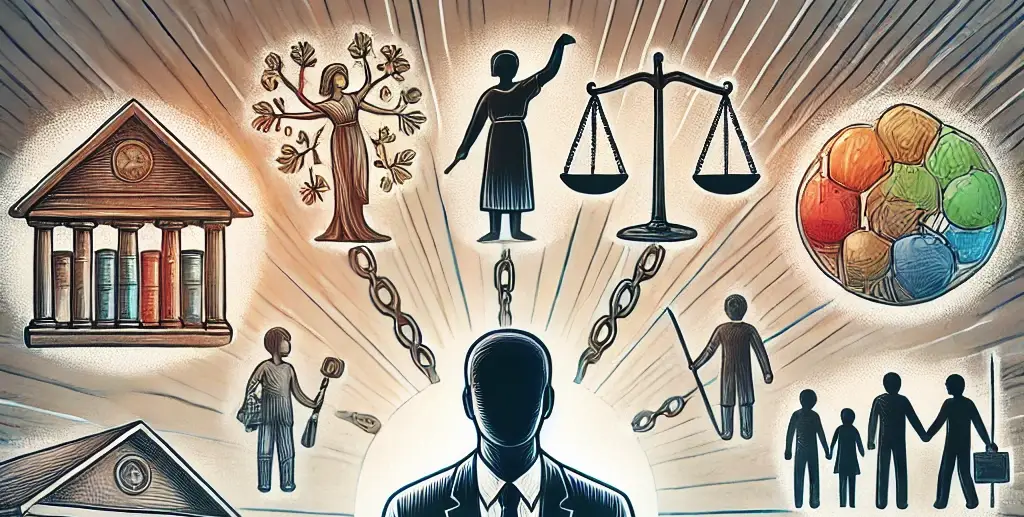Table of Contents
- The Concept of Institutionalization
- Early Theoretical Perspectives on Institutionalization
- Types of Institutionalization
- The Role of Power in Institutionalization
- Institutionalization and Social Change
- The Impact of Institutionalization on Individuals
- The Future of Institutionalization
- Conclusion
Institutionalization is a central concept in sociology that refers to the process through which social practices, norms, and behaviors become established and embedded in social structures. It is an essential mechanism by which societies maintain stability and continuity, even as individual members of society change over time. Understanding institutionalization involves recognizing the ways in which particular actions or ideas are codified, legitimized, and perpetuated across generations. This concept plays a key role in various sociological theories and is fundamental to understanding how societies function and evolve.
The Concept of Institutionalization
Institutionalization refers to the process through which particular patterns of behavior, belief systems, or social structures become established as the norm in a society or social group. When something is institutionalized, it is no longer seen as a matter of individual choice but as part of the structure of social life itself. It becomes embedded in the collective consciousness and is reinforced by cultural expectations, legal systems, educational practices, and other social institutions.
The process of institutionalization often begins informally, with certain behaviors or practices being repeated and imitated. Over time, these practices gain broader acceptance and are seen as the “right” or “natural” way of doing things. Eventually, formal structures, such as laws or organizational policies, may develop to enforce and maintain these behaviors. Once institutionalized, a practice or belief system gains legitimacy and becomes resistant to change, often persisting even when it no longer serves its original purpose.
Early Theoretical Perspectives on Institutionalization
The origins of the concept of institutionalization can be traced to classical sociological theory, particularly the works of Émile Durkheim and Max Weber. Both of these thinkers were concerned with the ways in which social order is maintained in complex societies, and institutionalization was a key mechanism in their explanations.
Durkheim, for example, argued that institutions represent the collective conscience of a society and that they are essential for social cohesion. For Durkheim, institutions, such as the family, religion, and education, play a crucial role in shaping individuals’ behavior and ensuring that society functions smoothly. These institutions provide the moral framework within which individuals operate, and they ensure that social norms are internalized and followed.
Max Weber, on the other hand, focused on the process of rationalization and how institutions become bureaucratic over time. He was particularly concerned with how formal structures, such as the legal system and bureaucracy, institutionalize certain behaviors through rules and regulations. According to Weber, modern societies are characterized by an increasing reliance on rational-legal authority, where institutionalized rules are codified and enforced by bureaucratic structures. This form of institutionalization creates stability and predictability, but it can also lead to rigidity and depersonalization.
Types of Institutionalization
Institutionalization can take many forms, depending on the social context in which it occurs. Some of the most prominent types of institutionalization include cultural, legal, and organizational institutionalization.
Cultural Institutionalization
Cultural institutionalization refers to the process through which particular ideas, values, or behaviors become embedded in the cultural fabric of a society. This form of institutionalization often occurs over long periods and is reinforced through socialization processes, such as family upbringing, education, and media representation. Cultural institutions, such as religion, education, and the media, play a significant role in perpetuating cultural norms and values.
For example, the institutionalization of gender roles is a classic case of cultural institutionalization. In many societies, certain expectations about what it means to be male or female have become deeply ingrained in the cultural fabric. These roles are reinforced through various institutions, such as the family, media, and education systems, making them appear as natural or inevitable, even though they are socially constructed.
Legal Institutionalization
Legal institutionalization occurs when certain practices or norms are codified into law. Laws are a formal means by which societies institutionalize specific behaviors, ensuring compliance through legal sanctions. The legal system, therefore, plays a critical role in institutionalizing behaviors that are deemed important for the functioning of society.
One key example of legal institutionalization is the regulation of labor practices. Over time, various labor practices, such as the eight-hour workday, minimum wage standards, and workplace safety regulations, have been institutionalized through legislation. Once codified, these practices become binding and are enforced through legal mechanisms, ensuring that they are adhered to by employers and employees alike.
Organizational Institutionalization
Organizational institutionalization refers to the process through which particular organizational practices and structures become standardized and embedded within organizations. This form of institutionalization is particularly relevant in modern societies, where bureaucratic organizations dominate many aspects of social life. In organizations, institutionalization often takes the form of policies, procedures, and hierarchical structures that guide behavior.
For example, large corporations often institutionalize certain hiring practices, performance evaluation systems, and decision-making processes. These practices become taken for granted as the “correct” way to operate within the organization, and they persist even when individuals who initiated them are no longer present. Organizational institutionalization can create stability and efficiency, but it can also lead to inflexibility and resistance to change.
The Role of Power in Institutionalization
Get the full article AD FREE. Join now for full access to all premium articles.
View Plans & Subscribe Already a member? Log in.





